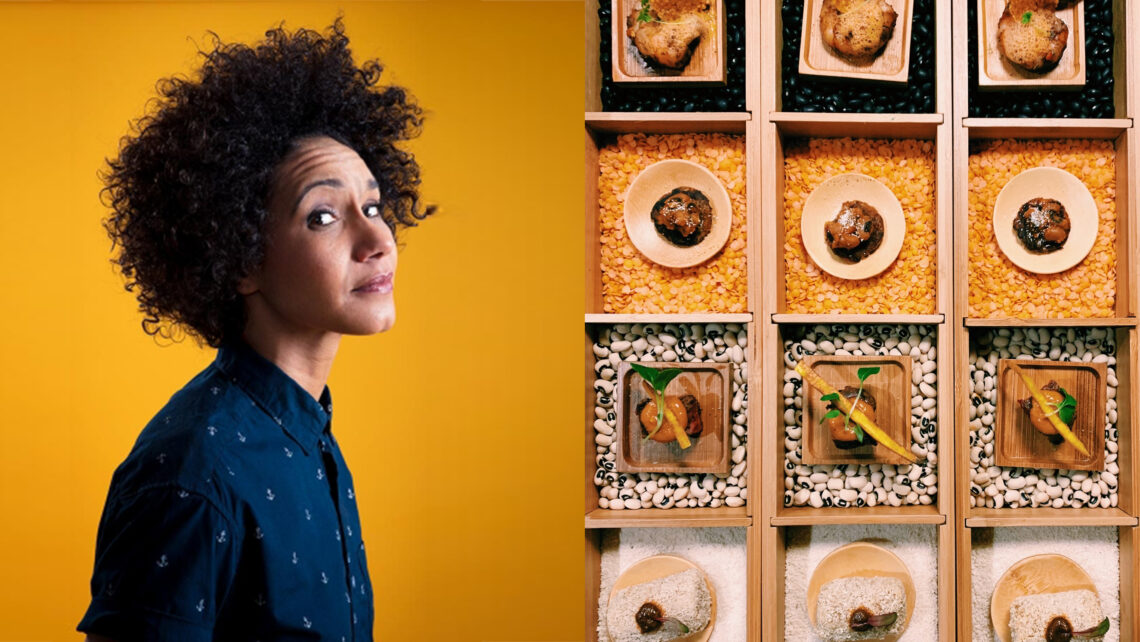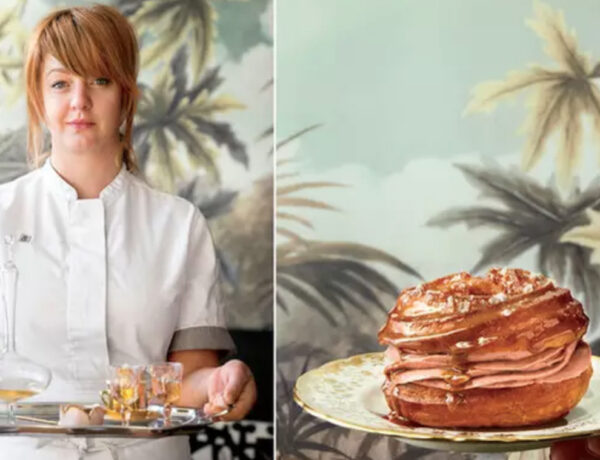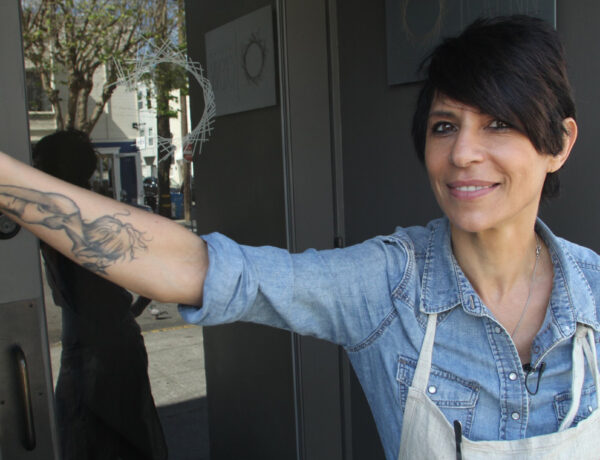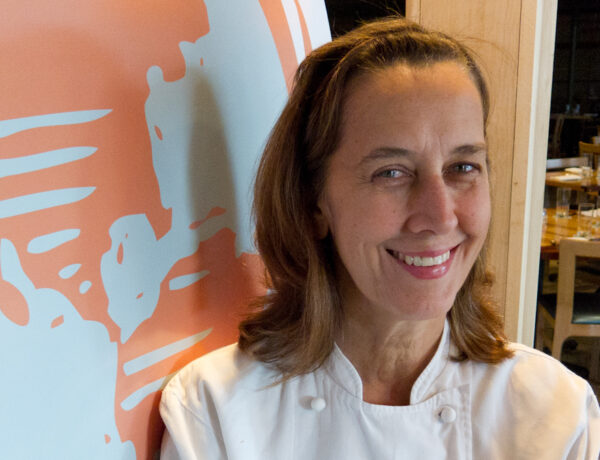When COVID-19 hit, chef, entrepreneur and author Zoe Adjonyoh found herself with an empty kitchen and no one to cook for. “It made me want to turn to my community and help,” says Zoe. So she started up a crowdfunding campaign to feed vulnerable people in her home city of London. While she originally set out to serve 150 meals per week, Zoe and her small team now cook and donate 500.
This is the brand of hustle that has gotten Zoe to where she is today. Credited with starting the African food revolution, she is the founder of the pop-up restaurant Zoe’s Ghana Kitchen and author of a cookbook by the same name. Zoe is now working on launching an ecommerce website that opens up access to healthy African foods and ingredients, as well as a new private dining concept in New York. We caught up with Zoe between these many ventures to learn more about how she got started and where she’s going next.

You started Zoe’s Ghana Kitchen 10 years ago and your business has since helped to ignite an African food revolution. Can you describe the process of starting your own business and some of the challenges you faced?
I like to say that Ghana Kitchen started before I started it. It started as a whim outside my front door during Hackney Wick arts festival to get a bit of pocket money after traveling around the States for a few months. Hackney Wick is known for being a hip, trendy, creative place. Think of Brooklyn 20 years ago. It was full of creativity, live-work studios—we were all artists or writers or photographers. No one else came there except for this one weekend when all the artists opened their studios up. I was bored, I was skint, I saw thousands of people coming in for Hackney Wick. So I made this peanut butter stew, which was a take on groundnut stew that was famous among my friends; they always asked me to cook that dish. My friend Ruth made a poster saying “Zoe’s Famous Peanut Butter Stew.” I borrowed the pot and this stovetop thing. There was a huge queue, it turned into this huge social gathering outside my flat. A lot of the people didn’t even know where Ghana was. It sold out every day for the three days of the festival.
There was this huge gap of one year. The same weekend of Hackney Wicked Arts Festival, I got some African fabrics, set up a table, put on a playlist. People came in and thought it was a restaurant. They were trying to book tables! I took their email addresses and said I’d let them know if I did it again. That’s when the supper clubs started. It was like hosting the best dinner party every time I did it.

Word about that spread really quickly and organically. People were talking about it because they were having a great time and loving the food. I was getting my degree at the time and catering jobs kept coming up. I didn’t have any catering background or hospitality experience. Someone would offer me work and I’d think about how to do it after. I wouldn’t advise people to do it that way these days, but at the time, the universe was pushing Ghana Kitchen towards me.
I moved to Berlin and was doing the whole Bohemian writer thing, but I kept being called back to London to do catering jobs. It forced me to sit down and think: why is this so popular? Why is it needed? Why do people love it?
There were a lot of African restaurants in London, but they weren’t known outside their community. I had created this community for everyone. It was fun, it was relaxed, it was an experience. It wasn’t just somewhere to eat.
What kind of dishes did you grow up eating? Who was the cook in your house? When did you start cooking?
My mom’s Irish and my dad’s Ghanain. He wasn’t an amazing cook—it wasn’t fancy or well thought out—but it was really good, basic home food. He was very laconic, but when he was around he was cooking. I learned from a very young age the relationship between food and identity. As my parents were both immigrants, it was a tool for them to go home. It was nostalgia, it was comfort. We didn’t have any Ghanain family in London and we couldn’t afford to go to Ghana, so that aspect of my identity was missing. Cooking Ghanain food became the way for me to connect with that. I learned watching my dad. My mum would also cook because she knew how much we loved that food. I’m pretty sure my mum made more peanut butter stew than my dad.
We lived near a big African market. I learned a lot talking to those women. Then in 2013 I went to Ghana and did some traveling around. I’d go to chop bars, roadside eateries, and then go into the kitchen and ask them to show me how they made the dishes. It was a lot of hands-on learning. Once I felt that I had license to do my own interpretation, I would play around with the ingredients to get a different flavor, a different combination.
In 2011 you said you wanted to start the African food revolution. Do you feel you’ve succeeded?
I’m a big believer in the power of stories. I think most of the reason I’ve had the success I’ve had is because I set a powerful narrative. This food is about my identity. I saw that the media’s portrayal of Africa was all about poverty, famine, negative stereotypes. I wanted to change that. That was my drive and passion.

At that moment I happened to have a brilliant moment of zeitgeist cooking. Jamie Oliver was all over TV, cooking programs were on fire, cookbooks were sexy and interesting. I had all those pieces working in my favor. But it took a long time. The African food revolution was a dream I wanted to happen—that people would be proud of their food and want to introduce it to people other than those in their family or network. It hadn’t been celebrated anymore near the extent of Mexican, Asian, and of course European food. There isn’t a long history of gastronomy in African because of slavery and colonialism. Food was about sustenance. But times have changed. We have a modern Africa. Part of that story is fashion, music and food.
In the time since my book came out the landscape in the UK has changed tremendously. There are many new restaurants in London doing contemporary food from African countries, more cookbooks, more street food businesses and supper clubs. There is more of an appetite to make that food front and center, to see Black people cooking African food or sharing the Black food experience. There’s a new consciousness in America of black chefs wanting to speak to the food media world. But while there’s more visibility, there’s still not nearly enough.
To that end, one of my long-term goals is to start a talent agency for people of color in food. The idea is to make it a resource but also a talent agency in its own right for food writers, sommeliers and other people in the industry, linking them to mentorship programs and funding for culinary training. My vision is to make it the top agency in the world for people of color.

How has your vision to share and redefine Ghanaian cuisine evolved over the years?
I’ve been really lucky since the book came out in the last few years. I’ve worked with some really talented and amazing chefs, it’s pushed me further. My ambitions creatively with food have changed a bit. I love what Ghana Kitchen is and stands for, but I’ve grown, how I want to cook has changed and developed. That’s what I’m doing with my new private dining project, Sankofa, that we’re hoping to launch in New York. We did a couple of test runs and they went very well. So it’s about going back to my roots, being more playful and creative. I’ve also got a couple cookbooks up my sleeve. I’m more in a space of collaboration when it comes to food.
I also have a plan to launch an e-shop that is more in the wellness space. For the most part, when you want to get healthy ingredients from the continent of Africa, like maringo, you have to buy huge quantities. People who have never tried something don’t want to buy a kilo. We’re reducing the amounts to a sample and give them a recipe to use it, as well as introducing people to spice mixes, but without people feeling they have to cook something African with it. It’s about incorporating African ingredients to everyday cooking to make it less “other” for people, to carry on that mission I’ve been doing for the last 10 years with a slightly different emphasis.
Have you encountered any challenges in the industry because of your gender? If so, can you speak to some of those and how you addressed them?
The problem of being a woman in food is part of the problem of being a woman generally: we’re all underpaid, overworked, under valued, in hospitality and other industries. Hospitality is a very, very tough business, it’s very competitive, you have to be working a lot.
It’s normal to work 16 hour days, seven days a week. I’m a lesbian without children who’s only recently married, so I didn’thave any commitments that would stop me from fueling my drive and attention to my business, but for a lot of women there have historically been a lot of barriers.
I didn’t go to culinary school. I was never in the food world. I wasn’t part of that whole dynamic until the cookbook came out. So I never had to deal with misogyny apart from hiring a male chef who didn’t want to take orders from a woman, but then he wouldn’t last very long. There’s been lots and lots of micro aggression about whether or not I’m a chef when I’ve been around other chefs, lots of passive aggressive bullshit.
What advice do you have for other women who are looking to forge their own path in food?
My advice is to pursue your joy and be fearless about it. If food is your true passion, if cooking is the thing you would do without getting paid—don’t go into food if you want to make money!—then be fearless about doing it. And try to reach out to a mentor or someone who inspires you.
Say yes. Figure it out later. Dare yourself to be great. It’s really just a question of self-belief. That’s the work we’ve all got to do. There’s no point being mediocre and doing things by halves. You have one chance to give something to the world and make a difference.






No Comments